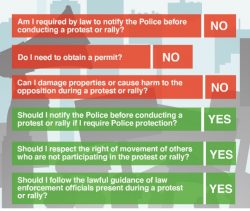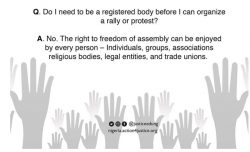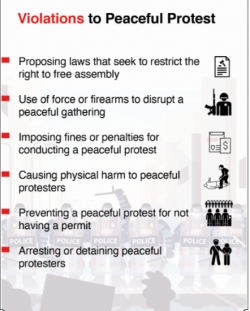Right to Protest. Organising and participating in rallies or protests
The protection of the right to freedom of assembly is very fundamental in a democratic society. The government as well as the citizens have distinctive roles to play in its protection. It is the primary responsibility of the state to put in place adequate mechanisms to ensure that the right to freedom of assembly is practically enjoyed and not hampered by undue restriction.
This responsibility of the government comes with a counter obligation on the part of the citizen to ensure that his or her right is exercised appropriately and in accordance with the law.

Should I obtain a permit before conducting a protest or rally?

The issuance of police permits for rallies, or any other assembly is not a requirement for the exercise of this right so the police cannot rely on the Act to demand people to apply for permits before organizing an assembly.
This was confirmed in the case of Inspector General of Police v. All Nigeria People’s Party (2008) 12 WRN 65, by the Nigeria Court of Appeal.
However, bear in mind that the Public Order Act 1979 in Section 1 of the Act empowers a State Governor to prescribe the route by which and the times at which any procession may pass. In this case, if the general public will be notified about this requirement prior to the rally.
In addition, while the use of uniforms for assembly is permitted by Section 7 of the Act, the Commissioner of Police in the relevant state may prohibit its use if it is offensive or is likely to cause a breach of the peace, so keep this in mind.
Do I need to notify the police before conducting a protest or rally?
Prior notification of the police before conducting an assembly is not necessary under international human rights law and Nigerian law. This has been judicially accepted as the law in Nigeria on various occasions.
Notification is essential when the organizers of an assembly require police protection during the assembly.
What should I do if I am asked for a permit at a rally?
Inform the security agents that the law does not require the issuance of a permit before a rally can be organised.
TIP: Print Inspector General of Police v. All Nigeria People’s Party (2008) permitting the organizing of rallies on placards during the rally. If it is very likely the rally will be obstructed, see the Fundamental Rights Enforcement Procedure steps at the end of this guide to get a court injunction before holding a rally.
What can I do if a protest or rally is banned?
If a protest or rally is banned, take care not to clash with the police. See “How do I take legal action to protect against breaches of freedom of assembly?” for more information.
How can Security Agencies violate my right to peaceful protest?

Some tips when organising assemblies, rallies or protests:
- Provide and publish goals, objectives, and a statement on applicable laws on rights and responsibilities of protesters and a policy statement on peaceful protest.
- Organizers of assemblies should cooperate with law-enforcement agencies to ensure that participants in their assemblies comply with the law. This can be done by obtaining police presence at protests.
- Organizers and participants should avoid violent activities or statements that could lead to violence.
- Organizers should consider what risks are presented by their assembly and how they would deal with them, should they materialize.
- Provide information to participants on mechanisms for protection, types of personal protective equipment to wear, resources available for medical care, and legal support.
If you are interested in information about arrests at protest, see our guide on Arrest by clicking here.
What can I do where I am harmed by security forces during a protest?
When harmed by security forces, these are the measures to take:
- First seek medical attention and obtain medical reports and pictures of the harm done.
- Contact a lawyer, human right organization or NHRC for assistance in notifying the appropriate authority in charge of the offender, attaching the medical reports and pictures to the notice.
If no positive response is received, then proceed to file a case in court to seek the enforcement of your right.
As an alternative to filing a suit, you could ask a lawyer to write a petition to the authorities in charge of the offender (the AIG or Human Rights Department of the Nigerian police Force, in the case of an offending police officer).